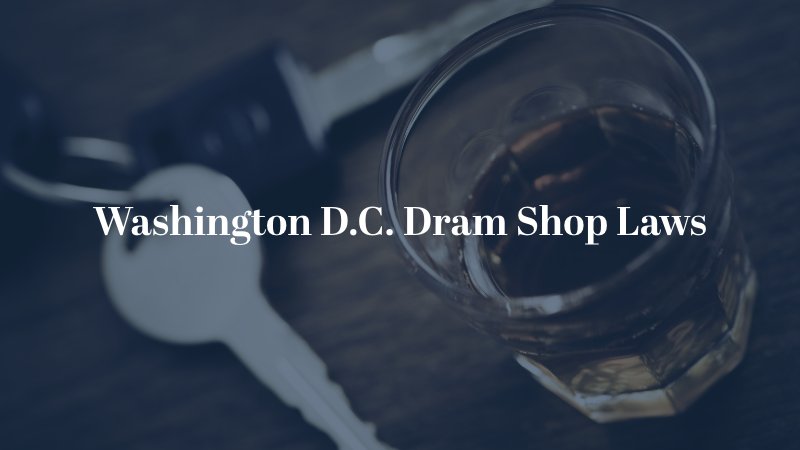
Dram shop laws are statutes that hold establishments such as bars, restaurants, and liquor stores liable for selling or serving alcohol to individuals who subsequently cause harm or damage. Dram shop laws aim to create accountability for businesses and serve as a deterrent against negligent or reckless alcohol service practices.
They also provide recourse for victims of alcohol-related incidents, allowing them to seek compensation from establishments that contributed to the damage by serving alcohol irresponsibly.
Washington D.C.’s Dram Shop Laws
In Washington D.C., dram shop laws specify strict guidelines for alcohol service to prevent alcohol-related harm. According to the law, establishments must not serve alcohol to anyone under the age of 21. Additionally, it is illegal to serve alcohol to an intoxicated person or an individual who appears to be intoxicated.
- 25–781. Sale to minors or intoxicated persons prohibited.
(a) The sale or delivery of alcoholic beverages to the following persons is prohibited:
(1) A person under 21 years of age, either for the person’s own use or for the use of any other person, except as provided in § 25-784(b); or
(2) An intoxicated person, or any person who appears to be intoxicated.
Consequences of Violating Dram Shop Laws
Violating dram shop laws in Washington D.C. can lead to significant legal consequences for businesses and individuals:
Civil Liability
Businesses that violate dram shop laws in Washington D.C. can face significant civil liability. If an establishment serves alcohol to a minor or an intoxicated person who then causes injury or damage, the establishment may be held legally responsible for the resulting harm.
Victims or their families can file lawsuits seeking compensation for medical expenses, lost wages, pain and suffering, and other damages caused by the incident. These legal actions can result in substantial financial penalties for the offending business.
License Revocation or Suspension
Establishments found in violation of dram shop laws risk having their liquor licenses revoked or suspended. The loss of a liquor license can significantly impact a business’s revenue and reputation, making it a serious consequence of non-compliance. Regulatory agencies oversee the enforcement of these laws and have the authority to take disciplinary action against businesses that fail to adhere to responsible alcohol service practices.
Reputational Damage
Reputation is crucial for any business, and violating dram shop laws can severely tarnish an establishment’s image. Negative publicity resulting from legal actions or penalties can dissuade customers from patronizing the business, leading to a decline in revenue and customer trust. Maintaining a good reputation requires adherence to legal standards and responsible practices.
Evidence Used to Prove Dram Shop Law Violations
Establishing violations of dram shop laws in Washington D.C. requires concrete evidence to substantiate claims against an establishment. The following types of evidence are commonly used in these cases:
- Sales Receipts and Records: Documentation showing the sale of alcohol to a minor or an intoxicated individual can be a key piece of evidence. These records may include time-stamped receipts or transaction logs.
- Surveillance Footage: Video recordings from security cameras can capture the sale and service of alcohol to visibly intoxicated customers, providing visual proof of irresponsible practices.
- Witness Testimonies: Statements from patrons, employees, or other witnesses who observed the sale of alcohol to minors or intoxicated individuals can support the claim.
- Medical Records: Documentation of any medical treatment received by the intoxicated person, including blood alcohol content (BAC) levels, can demonstrate the extent of intoxication.
If you’ve been injured and believe you have a viable claim based on dram shop laws and need professional legal assistance, our team is here to help. Contact a Washington D.C. personal injury attorney from Lightfoot Law, PLLC today to schedule a free consultation.